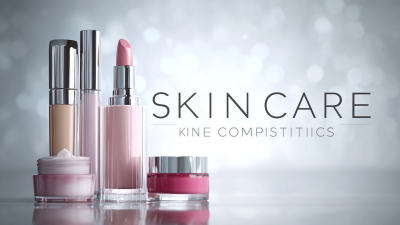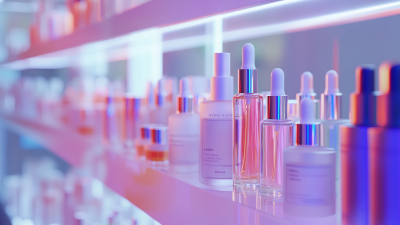Ultimate Guide to Exploring the Best Skin Care Solutions for Global Buyers
In today's fast-paced world, the pursuit of optimal skin care solutions has become a top priority for consumers across the globe. With an overwhelming array of products and treatments available, navigating through the plethora of options can be daunting for buyers seeking the best products to suit their unique needs. This Ultimate Guide to Exploring the Best Skin Care Solutions aims to provide a comprehensive checklist that highlights key factors to consider when selecting skin care products.

Whether you are searching for hydrating serums, anti-aging creams, or organic ingredients, our checklist is designed to simplify your decision-making process. By addressing essential aspects such as skin type, ingredient efficacy, and sustainability, we equip you with the tools necessary to make informed choices, ensuring your skin not only looks good but feels great.
Join us as we delve into the world of skin care, empowering you to achieve your desired skin health and radiance.
Identifying Your Skin Type: A Step-by-Step Guide for Global Buyers
Understanding your skin type is crucial for selecting the right skincare products that cater to your unique needs. According to recent industry reports, nearly 60% of consumers are likely to experiment with a skincare product if it is marketed with clear information about skin types and their specific benefits. This highlights the importance of personalized marketing strategies. As global buyers become increasingly knowledgeable, recognizing the diverse skin types—dry, oily, combination, sensitive, and normal—can significantly enhance your product offerings.
To systematically identify skin types, a five-step approach can be beneficial. Start with a thorough assessment of skin’s characteristics, including texture, oiliness, and sensitivity. Following this, consumers should conduct a patch test for new products to prevent adverse reactions. Leveraging social media platforms for educational content can play a pivotal role in this process, as driven by findings that indicate brands using user-generated content see a 25% increase in customer engagement. By focusing on educating consumers about their skin types, brands can not only foster loyalty but also optimize their marketing efforts in a competitive market.
Top Trending Skin Care Ingredients Around the World and Their Benefits
The skincare industry is evolving rapidly, with consumers increasingly seeking products that offer tangible benefits. According to a report by Grand View Research, the global skincare market is projected to reach $189.3 billion by 2025, driven by a rise in consumer awareness about personal grooming and the desire for high-quality, effective ingredients. Notably, trending ingredients such as hyaluronic acid, retinol, and vitamin C have garnered significant attention for their powerful anti-aging properties and skin hydration benefits.
 Hyaluronic acid, a naturally occurring substance in the body, can hold up to 1,000 times its weight in water, making it an essential ingredient for moisture retention. According to a study published in the Journal of Clinical and Aesthetic Dermatology, products containing hyaluronic acid can significantly improve skin hydration levels, reducing fine lines and enhancing skin texture. On the other hand, retinol, a derivative of vitamin A, helps to boost cell turnover and collagen production, addressing concerns like acne and hyperpigmentation.
Hyaluronic acid, a naturally occurring substance in the body, can hold up to 1,000 times its weight in water, making it an essential ingredient for moisture retention. According to a study published in the Journal of Clinical and Aesthetic Dermatology, products containing hyaluronic acid can significantly improve skin hydration levels, reducing fine lines and enhancing skin texture. On the other hand, retinol, a derivative of vitamin A, helps to boost cell turnover and collagen production, addressing concerns like acne and hyperpigmentation.
Tip: When choosing skincare products, look for those with clinically proven ingredients and verify the concentration levels to ensure effectiveness. Additionally, always perform a patch test before fully incorporating new products into your routine to avoid potential allergic reactions. Keeping an eye on emerging ingredients like niacinamide and peptides can also enhance your skincare regimen, as they offer various benefits, from evening skin tone to improving elasticity.
Essential Skin Care Routines: Day and Night Practices for Every Buyer
When it comes to skincare, establishing a dedicated routine is essential for maintaining healthy skin. A recent report from the International Journal of Dermatology highlights that approximately 60% of individuals experience skin issues due to improper care routines. This statistic emphasizes the necessity of a structured regimen, specifically tailored for both day and night practices. Morning routines should focus on hydration and protection, utilizing products rich in antioxidants and SPF to shield the skin from harmful UV rays and environmental pollutants. Layering a vitamin C serum under a broad-spectrum sunscreen can significantly improve skin texture and prevent premature aging.
As night approaches, the skin enters a reparative phase, making it crucial to use more intensive treatments. The dermatological community suggests that incorporating retinoids can enhance cellular turnover, while hyaluronic acid aids in deep moisture retention. According to a study published in the Journal of Clinical and Aesthetic Dermatology, users of retinoids reported a 50% improvement in skin clarity after consistent use over three months. For a holistic approach, adding a gentle exfoliant a few times a week can help remove dead skin cells, allowing subsequent nourishment products to penetrate effectively. By aligning day and night routines with scientifically-backed recommendations, global buyers can achieve not only aesthetic but also long-term skin health.
Ultimate Guide to Exploring the Best Skin Care Solutions for Global Buyers
| Skin Care Routine | Morning Practices | Evening Practices | Recommended Products |
|---|---|---|---|
| Basic Routine | Cleanser, Moisturizer, Sunscreen | Cleanser, Moisturizer, Night Cream | Gentle Cleanser, Hydrating Moisturizer |
| Anti-Aging Routine | Cleanser, Vitamin C Serum, Sunscreen | Cleanser, Retinol, Night Cream | Hydrating Cleanser, Vitamin A Cream |
| Acne-Prone Routine | Foam Cleanser, Oil Control Moisturizer, Sunscreen | Salicylic Acid Cleanser, Light Moisturizer | Exfoliating Cleanser, Acne Treatment Gel |
| Sensitive Skin Routine | Gentle Cleanser, Soothing Moisturizer, SPF | Soothing Cleanser, Night Repair Cream | Hypoallergenic Cleanser, Calming Cream |
How to Choose Skin Care Products: Tips for International Shoppers
When shopping for skin care products as an international buyer, it's essential to consider a few key factors to make the best choices. First and foremost, understanding your skin type is crucial. Whether you have dry, oily, combination, or sensitive skin, knowing how your skin behaves can help you identify products suited to your needs. Reading labels and ingredient lists is vital; look for products that contain beneficial ingredients like hyaluronic acid for hydration or salicylic acid for acne-prone skin.

Additionally, take into account the local climate and environmental conditions of the region where you will be using the products. Different climates can affect how your skin responds to products, so it's wise to adapt your regimen accordingly. Check for international shipping options or local versions of popular brands that may cater more specifically to your skin's needs. Lastly, don't forget to consider any allergies or sensitivities; always perform a patch test before fully incorporating a new product into your routine.
By keeping these tips in mind, international shoppers can navigate the extensive world of skin care with confidence and find solutions that truly work for them.
Understanding Labels and Certifications: What Every Buyer Should Know
When it comes to selecting skin care products, understanding labels and certifications is essential for global buyers. In an industry rife with misleading claims, discerning the authenticity of product information can guide consumers toward effective and safe choices. According to a report by Statista, the global skincare market is expected to reach USD 189.3 billion by 2025, underscoring the intensity of consumer demand and the necessity for transparency in product labeling.
Certification marks, such as EcoCert and USDA Organic, provide a reliable measure of a product's quality and adherence to specific standards. For instance, a survey conducted by the International Cosmetic Ingredient Dictionary revealed that 67% of consumers prioritize products with certifications when making purchasing decisions. Additionally, understanding terms like "non-comedogenic" or "hypoallergenic" can help buyers avoid products that may not suit their skin type. Therefore, being informed about the meaning of various labels and certifications equips consumers to make educated choices that match their skin care needs.
Skin Care Solutions Popularity by Category
Related Posts
-

Unveiling the Latest Trends in Skin Care Cosmetics for Global Buyers in 2023
-

Unlock Radiant Skin: A Step-by-Step Guide to Choosing the Best Skin Care Cosmetics
-

Unique Examples of Innovative Skin Care Products Transforming Beauty Routines
-

Unlocking the Global Skin Care Market Potential with a Focus on Consumer Trends and Emerging Ingredients
-

Future Innovations in Skin Cosmetics A Comprehensive Guide for Global Buyers
-

Exploring the Key Features of Care and Beauty Products: A Comprehensive Guide to Ingredient Efficacy and Benefits
